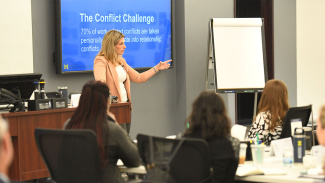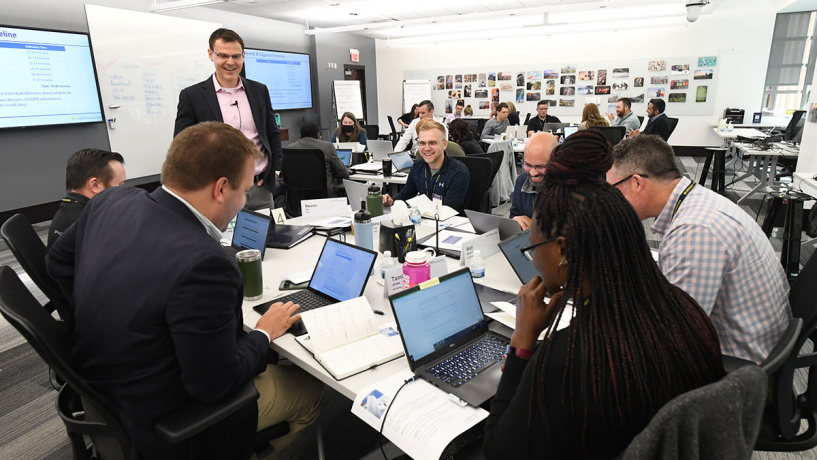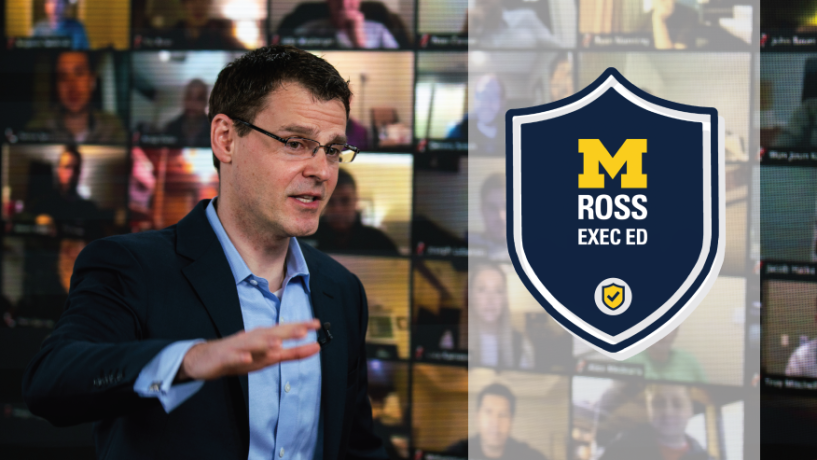New Michigan Ross Executive Education Program Teaches How To Lead Teams Effectively Today and Be Ready for Future Challenges

The Ross School of Business has redesigned its highly popular Leading High-Performing Teams open enrollment Executive Education program to meet the evolving needs of team leaders in the modern workplace.
Starting this fall, the new program, called Leading Future-Ready Teams, will help participants learn how to lead teams that deliver immediate results and equip them with the skills to navigate tomorrow's challenges. The program will answer important questions that business leaders are facing, including how to create a future-ready team, how a team can thrive while achieving exceptional outcomes, and how to build an inclusive environment.
Like its predecessor, Leading Future-Ready Teams will be a high-impact, three-day program taught by world-class Michigan Ross faculty members and is aimed at team leaders and project managers across a wide range of industries and functions. It will also remain an in-person program, with its first iteration running Sept. 19-21 at Ross.
“While Leading High-Performing Teams provided best practices for leading teams in a traditional business setting, we designed Leading Future-Ready Teams to address today’s modern workplace, where work often is conducted in hybrid and remote settings and is increasingly more diverse,” said Dave Mayer, faculty co-director of the program and John H. Mitchell Professor in Business Ethics at Michigan Ross. “We also recognize that with so many forces impacting the way business is conducted globally, team leaders must be ready to handle unforeseen challenges that arise.”
Each daylong session of Leading Future-Ready Teams will cover a different theme. Day one on designing teams will focus on topics such as leading purpose-driven teams, leveraging diversity, and creating a positive hybrid working environment; day two will focus on people in teams, including personal effectiveness, managing high-emotion discussions, and well-being; and day three will focus on team processes like decision making and clarity of vision and cascading goals.
The importance of being able to successfully manage teams
The launch of the redesigned Executive Education program is especially timely given the complex challenges now facing team leaders in the business world, said Lindy Greer, faculty director of the Sanger Leadership Center at Michigan Ross, who co-directs and teaches in the Leading Future-Ready Teams program with Mayer.
“Teamwork is needed more than ever for organizations to navigate the increasingly turbulent business environment where technological advancements and social and political issues are forcing changes to leadership practices,” explained Greer.
Leading Future-Ready Teams will prepare learners with the team dynamic, leadership, and communication skills needed to be successful, including navigating uncertainty, integrating technology, creating agility, and embracing diversity.
Building on success, continuing innovation in executive education
The new Michigan Ross Executive Education offering will also build on the success of its former Leading High-Performing Teams program, which has welcomed more than 600 participants in Ann Arbor, Hong Kong, and Singapore since 2006.
In addition, the launch of Leading Future-Ready Teams follows Michigan Ross again securing its global Top 10 status in the 2022 Financial Times executive education rankings, where it also earned the No.1 school for executive education in North America. It also continues the momentum of innovative new Executive Education offerings by Michigan Ross. Last year, Ross announced a new Accelerated Management Development Certificate Program, which is the school’s first online executive education offering that allows participants to earn a certificate of merit.










